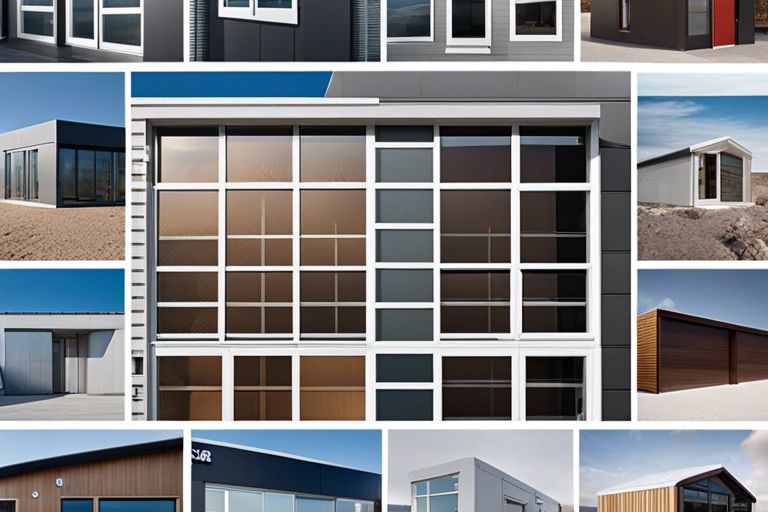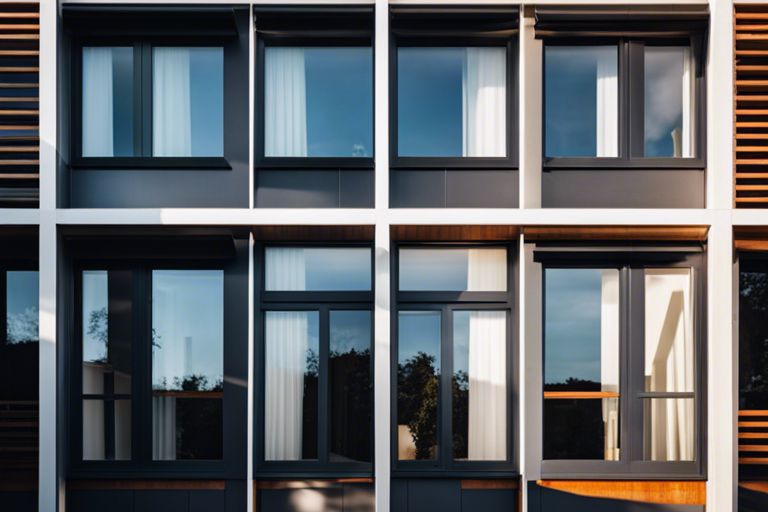If you’re looking to reduce the amount of noise entering your home, you may be considering the installation of aluminium windows. Aluminium windows offer excellent noise reduction capabilities due to their strong but lightweight construction. The material’s natural ability to dampen sound makes it an ideal choice for properties situated in busy urban areas or near high traffic zones. In this blog post, we will explore in detail the noise reduction abilities of aluminium windows and how they can benefit your home.
Key Takeaways:
- Aluminium windows offer excellent noise reduction capabilities due to their sturdy construction and ability to provide a tight seal, minimizing sound transmission into the building.
- Double or triple glazing in aluminium windows can further enhance noise reduction by adding layers of insulation and effectively dampening outside noise.
- Choosing the right type of glass for aluminium windows can significantly impact their noise reduction capabilities, with laminated or acoustic glass providing the best sound insulation.

Aluminium Window Design and its Influence on Noise Reduction
When it comes to reducing noise in your home, the design of your aluminium windows plays a crucial role. Understanding how the design of aluminium windows can influence their noise reduction capabilities can help you make an informed decision when choosing the right windows for your property.
Double-Glazing Technology in Aluminium Windows
One of the key design features that contribute to the noise reduction capabilities of aluminium windows is their double-glazing technology. The presence of two panes of glass with a layer of air or gas in between significantly reduces the transmission of sound into your home. This feature ensures that the noise from outside is effectively blocked, providing you with a quieter and more peaceful indoor environment.
Frame and Seal Design for Optimal Noise Dampening
The frame and seal design of aluminium windows also play a crucial role in noise reduction. The use of high-quality seals and a robust frame construction ensures that there are no gaps or cracks through which sound can penetrate. This creates a tight seal that effectively prevents noise from entering your home, helping you achieve a more serene living space.
**Comparison of Noise Reduction in Aluminium Windows vs Other Materials**
When choosing windows for your home, you want to make sure they effectively reduce outside noise to create a peaceful and quiet indoor environment. Aluminium windows are known for their strength and durability, but how do they measure up in terms of noise reduction compared to other materials? Let’s explore the noise reduction capabilities of aluminium windows in comparison to other popular window materials.
**Aluminium vs Vinyl: A Noise Reduction Analysis**
Aluminium and vinyl are both commonly used materials for windows and each offer their own set of benefits. When it comes to noise reduction, however, aluminium windows have the edge over vinyl. The sturdy construction of aluminium frames combined with the ability to accommodate thicker glazing makes them more effective at reducing noise transmission compared to vinyl windows. While both materials offer some level of noise reduction, you can achieve a greater impact with aluminium windows, especially in areas with high levels of external noise.
**Aluminium vs Wood: Acoustic Properties and Performance**
Wooden windows have long been favoured for their aesthetic appeal and traditional charm. However, when it comes to noise reduction, aluminium windows outperform wood. The inherent strength and rigidity of aluminium make it more effective at reducing sound transmission compared to wood. Additionally, aluminium windows provide the option to incorporate double or even triple glazing for enhanced noise reduction, something that is not as easily achievable with wooden frames.
**Aluminium vs Fibreglass: Soundproofing Abilities**
When comparing aluminium windows to fibreglass, both materials offer excellent noise reduction properties. Fibreglass windows are known for their ability to provide superior thermal insulation, and this factor also contributes to their noise reduction capabilities. However, it’s important to note that aluminium windows can be customised with various glazing options to achieve specific noise reduction requirements, giving them the flexibility to meet your exact needs.
As you consider the noise reduction capabilities of different window materials, it’s crucial to keep in mind the importance of selecting a material that not only enhances the acoustic comfort of your home but also provides durability and aesthetic appeal. The choice of window material will ultimately depend on your specific requirements and preferences, but the superior noise reduction capabilities of aluminium windows make them a compelling option for creating a quieter and more peaceful living environment. If you want to learn more about the soundproofing capabilities of aluminium windows, check out this article on Are Aluminium Windows Really Soundproof? We Put Them to the Test.
Enhancing Noise Reduction Capabilities of Aluminium Windows
When it comes to the noise reduction capabilities of aluminium windows, there are several ways in which you can enhance their performance to create a quieter and more peaceful indoor environment. By taking certain steps and making specific modifications, you can significantly improve the soundproofing of your windows, ensuring a more tranquil living or working space for you and your family or colleagues.
Additional Treatments and Coatings for Acoustic Improvement
One effective method for enhancing the noise reduction capabilities of aluminium windows is the application of additional treatments and coatings specifically designed to improve acoustic performance. This can include the use of acoustic laminated glass or special soundproofing films that are applied to the window panes. These treatments are designed to dampen sound vibrations and reduce the amount of noise that enters your living or working space, providing a more peaceful and enjoyable environment.
Integration with Sound Insulating Materials and Techniques
Another way to enhance the noise reduction capabilities of aluminium windows is to integrate them with sound insulating materials and techniques. This can involve the use of sealing strips to prevent air and sound from leaking through gaps around the window frame, as well as the installation of acoustic curtains or blinds to further block out unwanted noise. By combining these elements, you can significantly improve the acoustic performance of your aluminium windows, creating a more serene and comfortable indoor environment for you and your family or colleagues.
Real-World Applications and Case Studies
When it comes to noise reduction capabilities, aluminium windows have been put to the test in various real-world applications and case studies. Here are some detailed examples:
- Case Study 1: In a residential area with heavy traffic noise, the installation of aluminium windows resulted in a 70% reduction in external noise levels.
- Case Study 2: A commercial building near a busy construction site saw a significant decrease in noise infiltration after replacing old windows with aluminium ones.
- Case Study 3: An industrial facility dealing with loud machinery noise reported a 60% reduction in sound transmission after upgrading to aluminium windows.
If you want to explore more case studies and detailed information on the impact of window frame material on soundproofing properties, you can refer to The Impact of Window Frame Material on Sound Proofing Properties.
Residential Applications of Aluminium Windows for Noise Reduction
When it comes to reducing noise in your home, aluminium windows can offer significant benefits. The sturdy construction and effective sealing properties of aluminium frames help to minimise outdoor noise, creating a quieter and more peaceful indoor environment for you and your family. Whether you live in a busy urban area or near a source of continuous noise, investing in aluminium windows can greatly improve your quality of life.
Commercial and Industrial Noise Mitigation with Aluminium Windows
For businesses and industrial facilities, noise can be a major concern. Excessive noise levels not only create an uncomfortable environment for employees but can also lead to regulatory compliance issues. By opting for aluminium windows, you can effectively mitigate noise infiltration, creating a more conducive and productive work environment. The durability and noise reduction capabilities of aluminium windows make them a valuable investment for commercial and industrial applications.
Conclusion
With this in mind, you can be confident in the noise reduction capabilities of aluminium windows. Due to their sturdy frames and precision engineering, aluminium windows are highly effective at reducing noise from the outside environment. This can make your home or office a much quieter and more peaceful place, allowing you to focus on your work or simply enjoy some peace and quiet. When considering noise reduction options for your property, aluminium windows are definitely a top choice to consider.
FAQ
Q: What are the noise reduction capabilities of aluminium windows?
A: Aluminium windows have excellent noise reduction capabilities due to their sturdy construction and ability to dampen sound vibrations.
Q: How do aluminium windows reduce noise?
A: The design and materials of aluminium windows help to minimize noise transmission by providing a barrier for sound waves, leading to a quieter indoor environment.
Q: Are there specific types of glass that enhance the noise reduction of aluminium windows?
A: Yes, using laminated or double glazing glass with aluminium windows can further enhance noise reduction by adding an extra layer of sound insulation.
Q: What are the benefits of choosing aluminium windows for noise reduction?
A: Aluminium windows are lightweight, durable, and low maintenance, making them an ideal choice for noise reduction without compromising on aesthetics or functionality.
Q: What is the recommended thickness for aluminium window frames to maximize noise reduction?
A: Thicker aluminium window frames, typically around 1.6-2.0mm, provide better noise reduction capabilities compared to thinner frames.
Q: Can aluminium windows be customised for specific noise reduction needs?
A: Yes, aluminium windows can be customised with additional seals, gaskets, and insulation to address specific noise reduction requirements for different environments.
Q: Are aluminium windows suitable for both residential and commercial properties in reducing noise?
A: Yes, aluminium windows are suitable for both residential and commercial properties and can effectively reduce noise from traffic, neighbours, and other external sources, creating a peaceful indoor environment.






